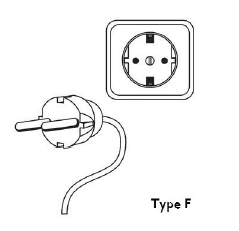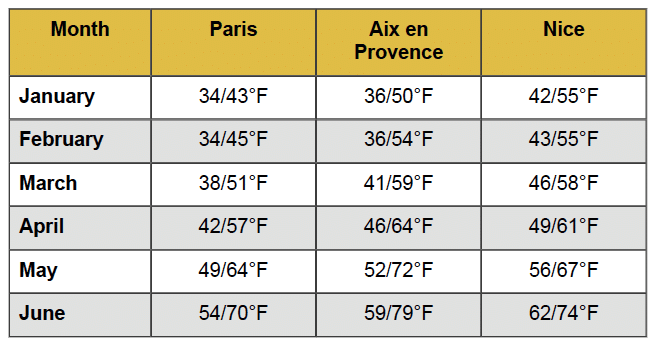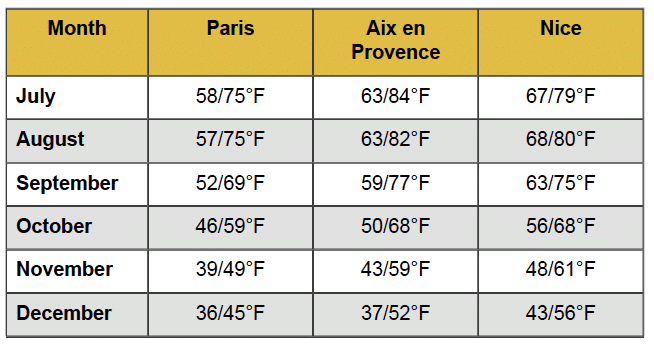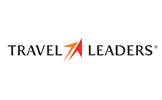FRANCE

Fun Facts From Globus Tours
![]()
- France is one of the most visited tourist destinations in the world.
- The Eiffel Tower stands at a height of 984 feet, almost the height of a 70-story building.
- France has the sixth-largest economy in the world.
With an area of roughly 212,500 square miles, France is the largest country in Europe—yet only a fourteenth the size of the U.S.A.! Its population is approximately 65.2 million. Shaped roughly in the form of a hexagon, it has almost entirely natural boundaries: the North and Mediterranean Seas, the English Channel, the Atlantic Ocean, and the Pyrenees Mountains. It is a country of variety and a patchwork of regions, each with a unique identity. It is a modern country steeped in tradition with architectural masterpieces and rural scenery little changed for many centuries. It has a wealth of historical monuments: Greek, Roman, Romanesque, and Gothic. The French are justly proud of their magnificent palaces, churches, cathedrals, and castles.
France is beloved by artists from all over the world – both past and present – including Leonardo da Vinci, Vincent van Gogh, and Picasso, who made the country their home. It is the birthplace of Impressionism with painters Monet, Manet, and Degas. It was the cradle of great philosophers, writers, and scientists, including Voltaire, Victor Hugo, and Pasteur; it has also had great leaders, such as Joan of Arc and Napoleon.
The climate, the variety of the soil, the local produce, and the skillful savoir-faire of its chefs have earned French cuisine international fame. Try one of its numerous cheeses (over 400 kinds), savor some of its great wines and champagne, and be sure to visit one of its pastry shops–patisserie. Shop for lace, pottery, perfume, china, beautiful Parisian scarves, and designer labels. Relax and watch the world go by in one of the cafés
in true French style, absorbing the French love of philosophy and their eternal search for the meaning of life; the motto of Descartes was “I think, therefore I am.” This is a country firmly and successfully established in the 21st century, yet still maintaining its legendary douceur de vivre (sweetness of life).
VISAS, PASSPORTS, AND OTHER ENTRY REQUIREMENTS
Visas to France are not required for US citizens. If you hold a passport from another country, please check with your local consulate about requirements for travel to France. All passengers traveling internationally are required to have a passport. Please carry proper identification (your passport) on you and do not leave it in your suitcase or hotel room.
It is advisable to carry your passport with you at all times.
COUNTRY CODES
The country code for France is 33. When calling to France from overseas, dial your international access code (011 from the US/Canada), followed by the country code, area code, and phone number. Phone numbers in France are 9 digits in length. Dialing from the US/Canada: 011 33+##+ ### ####.
CURRENCY
The official currency of France is the Euro.
Bank hours 9 a.m.-12 p.m. and 2 p.m. – 4 p.m. Monday through Friday.
1 EURO (€) = 100 Cents (c)
- Banknote denominations: €5, €10, €20, €50, €100, €200, €500
- Coin denominations: 1c, 2c, 5c, 10c, 20c, 50c, €1, €2
Euro coins differ according to country, but they can be used in any Eurozone state. Bank notes are of uniform EU design (depicting European architectural styles throughout seven ages, from Classical to Modern times).
For the most current exchange rates, please go to our website at Globusjourneys.com/Currency.
Credit cards are widely accepted in France (mostly Visa and MasterCard), and you should have no problems using them in larger shops and restaurants. Smaller shops may ask you to pay in cash or have a minimum amount required to use a credit card.
It is becoming more difficult to exchange money at banks in France; you may be able to exchange small amounts at post offices.
BUDGETING AND SHOPPING
The following budget guidelines are just approximate values or starting values for meals and are per person. Actual prices will vary widely by restaurant and city within a country but below are some averages as provided by our experienced personnel.
- The approximate cost of a soft drink/mineral water/coffee is €2-4.
- An average lunch consisting of a salad or sandwich and a soda or water starts at approximately €8-15.
- Dinner at a mid-range restaurant with dessert and a non-alcoholic beverage starts at approximately €30-40.
Please note that soft drinks and mineral water are often as expensive, if not more expensive than wine or beer.
Shopping specialties: lace, pottery, perfume, china, Parisian scarves, designer labels.
Counterfeit and pirated goods are widely available; be aware that under local law transactions involving such products may be illegal, and bringing them home may result in confiscation and fines.
Sales tax or VAT (value added tax) is included on price tags. To obtain VAT refunds (which may take up to three months to process), special forms usually have to be stamped by Customs; please ask for a tax-free shopping form with each purchase and follow the instructions for completion. Customs import charges on items shipped home are not included in purchase prices.
TIPPING
At restaurants in France, a 15% service/cover charge is usually included in the check (“service compris”), but it is still customary to leave a small tip to show appreciation for good service. Some general tipping guidelines for France:
● In a café, €0.20 for a drink and €0.50 for a snack.
● In a restaurant, €1-2 per person (tips are usually left in cash and not added to the credit card payment).
If however service is not included (“service non compris”), a 15% tip is appropriate.
At bars or bakeries, sitting down to eat and drink costs more than standing up or takeaway.
For taxis, round up the fare by €1 for a city ride; add €2 for a ride from/to the airport. Taxi drivers charge extra per bag and fourth passenger.
Tip hotel staff €1 for room service.
Sometimes a few coins will be needed for public restrooms. If there is a saucer with coins in a restroom, it is common to leave small change as a tip.
ELECTRICITY AND ELECTRICAL OUTLETS
Outlets
Voltage for outlets is 220V. North American voltage is generally 110V. Therefore, you will need a converter for your travels. Adapters will be necessary to adapt your plug into the outlet, but these may not convert the voltage, so both devices are necessary. France uses a round, 2-prong plug that looks like:

TEMPERATURES
Summers are warm, especially in the south. Winters are wet and cooler, with snow in the mountains. Pack lightweight clothes in the summer; don’t forget your beachwear if you think you might head to the coast. Bring warm clothes for winter, especially in mountainous regions. To help you plan, below are average low and high temperatures for France.


To convert to Celsius, subtract 30, then divide by 2. While not exact, this simple formula will give a close estimation.
CUSTOMS and CULTURE
Pre-vacation reading for the south of France: Peter Mayle’s A Year in Provence and Toujours Provence or Yvonne Lenard’s The Magic of Provence.
FOOD SPECIALTIES
Cheeses (over 400 kinds), wines and champagne, sweet pastries (patisserie) crêpes, onion soup, and quiches. Eggs, bacon, steaks, and other meats may be cooked very lightly, as this is the way usually enjoyed locally; ask chefs to prepare them the way you prefer.
CUSTOMS and CULTURE

Travelers should not photograph or film anything perceived to be of a sensitive nature, such as government buildings, diplomatic missions, border formalities, or military interests.
Visitors are advised to dress and behave conservatively, consistent with local custom and sensitivities.
FEW WORDS OF THE LOCAL LANGUAGE
French
![]() Good morning/day (until 5 p.m.): Bonjour, Good evening: Bonsoir, Goodbye: Au revoir, Please: S’il vous plaît, Thank you: Merci, Yes: Oui, No: Non, Do you speak English?: Parlez-vous anglais?, I don’t understand: Je ne comprends pas, Please write it down: S’il vous plaît, écrivez-le, How much?: C’est combien?, 1: Un, 2: Deux, 3: Trois, 4: Quatre, 5: Cinq, 6: Six, 7: Sept, 8: Huit, 9: Neuf, 10: Dix, Where is…?: Où est…?, Telephone: Le téléphone, Bathroom: Les toilettes, Tea: Thé, Coffee: Café, Bottled water: De l’eau minérale (carbonated=eau petillante, non-carbonated=eau plate), Cheers!: Santé!, Restaurant check/bill: L’addition, Waiter: Monsieur (not garçon), Waitress: Mademoiselle, Have a nice day!: Bonne journée!.
Good morning/day (until 5 p.m.): Bonjour, Good evening: Bonsoir, Goodbye: Au revoir, Please: S’il vous plaît, Thank you: Merci, Yes: Oui, No: Non, Do you speak English?: Parlez-vous anglais?, I don’t understand: Je ne comprends pas, Please write it down: S’il vous plaît, écrivez-le, How much?: C’est combien?, 1: Un, 2: Deux, 3: Trois, 4: Quatre, 5: Cinq, 6: Six, 7: Sept, 8: Huit, 9: Neuf, 10: Dix, Where is…?: Où est…?, Telephone: Le téléphone, Bathroom: Les toilettes, Tea: Thé, Coffee: Café, Bottled water: De l’eau minérale (carbonated=eau petillante, non-carbonated=eau plate), Cheers!: Santé!, Restaurant check/bill: L’addition, Waiter: Monsieur (not garçon), Waitress: Mademoiselle, Have a nice day!: Bonne journée!.
U.S. DEPARTMENT OF STATE COUNTRY INFORMATION
Additional country-specific information for US citizens can be found on the US Government’s website www.travel.state.gov. Here, you can find the most up-to-date information about destination descriptions, passports/visas, safety and security, transportation, travel local laws, alerts/warnings, vaccinations, and more. For citizens of other nations, we recommend you consult your local consulate for travel information, regulations, and requirements.








